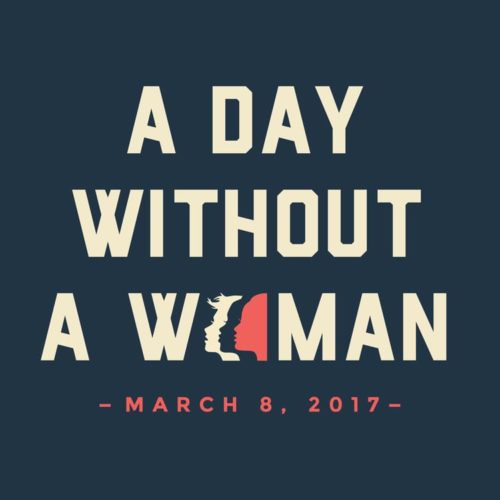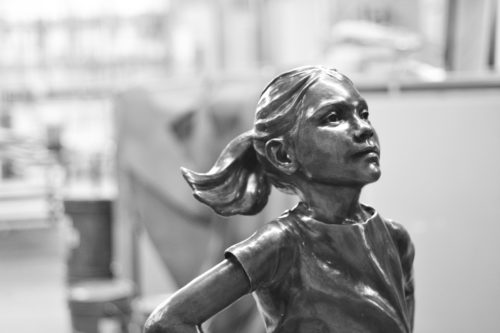TWH — On Tuesday morning, visitors to lower Manhattan were greeted with a new sculpture facing the famous Wall Street bull. With hands on her hips and her hair in a pony tale, a little girl stairs defiantly at the charging creature. Titled “The Fearless Girl” and created by Kristen Visbal, this new art installment was placed overnight by advertising agency McCann New York and its client State Street Global Advisors (SSGA). For what purpose? To celebrate International Women’s Day and to send the message that women play a vital role in the workforce.
![State Street Global Advisors Calls on 3,500 Companies Representing More Than $30 Trillion in Market Capitalization to Increase Number of Women on Corporate Boards [Photo: Business Wire]](https://wildhunt.org/wp-content/uploads/2017/03/state-street-500x330.jpg)
[Photo Credit: Frederica Valabrega]
While SSGA’s focus is on gender equality in corporate culture, it joins a number of other businesses, organizations, and individuals that are using this Mar. 8 International Women’s Day to send a message about gender equality and to celebrate the lasting and critical contributions that women have made to society.
One of the more well-known efforts has been the International Women’s Strike, or a “Day Without a Woman,” which was organized by the same group that staged the women’s march in January. On the website, organizers explain,
In the same spirit of love and liberation that inspired the Women’s March, we join together in making March 8th A Day Without a Woman, recognizing the enormous value that women of all backgrounds add to our socio-economic system–while receiving lower wages and experiencing greater inequities, vulnerability to discrimination, sexual harassment, and job insecurity. We recognize that trans and gender nonconforming people face heightened levels of discrimination, social oppression and political targeting. We believe in gender justice.
The organizers are asking participants to wear red, to not engage in paid or unpaid work, and to not make any purchases. 30 groups, including the Sierra Club, Amnesty International, Black Women’s Roundtable, and Moms Demand Action, are endorsing this effort. It has reportedly created some problems around the country.
For example, as reported by a North Carolina CBS affiliate, the entire Chapel Hill-Carboro school district in the eastern portion of the state will be closed to students Wednesday. In a news release, the school board confirmed that it “values its female employees.” However, the shutdown was not “an endorsement of the demonstration.” The board press release said that “the decision was made solely to avoid operating school on a day when there are insufficient staff to provide instruction and basic school services.”
According to the district’s blog, teachers and staff started asking for Mar. 8 off weeks ago. As the date came closer, it became obvious to the board that the “number [of these requests] was significant,” and there would not be enough staff to “to safely run [the] school district.” The Chapel Hill-Carrboro area is not the only one reportedly affected by the boycott. There are similar stories coming in from around the country and from different sectors of society, even the federal government.

Like anything else, not everyone agrees with these specific actions, and there are many other ways to honor the day. Rev. Selena Fox, a longtime activist working for gender equality, discussed the movement on her radio program Tuesday evening. The special edition of Nature’s Talk, titled “My Feminist Adventures,” celebrates Women’s History Month and International Women’s Day. Rev. Fox said, “I shared some of my experiences working for equal rights for women in the USA and globally over the past 50 years.” She also held a special ritual Saturday at Circle Sanctuary‘s temple in Wisconsin.
As Fox notes, March is, in fact, Women’s History Month. This is an official designation in the United States, the U.K, Australia and Canada, and it was adopted in these countries to correspond with the much older celebration of International Women’s Day (IWD).
When did IWD begin? The project’s website reports that a 1908 women’s march in New York was the first beginnings of the event. “Great unrest and critical debate was occurring amongst women. Women’s oppression and inequality was spurring women to become more vocal and active in campaigning for change.”
Then in 1909, the first National Women’s Day was held, but only in the U.S. The following year at a conference for working women in Copenhagen, German politician Clara Zetkin proposed the idea of an International Women’s Day.The concept was universally accepted, and in 1911 the first IWD was celebrated in a number of countries around the world. Since that point, the celebrations have spread.
It wasn’t until 1975 that the United Nations honored the day, but the global organization has since joined in what has become an aggressive effort to support women and promote gender equality. As written in a Mar. 8 article published on the UN’s news blog: “As the rights of women and girls around the world are being reduced and restricted, the United Nations today marked International Women’s Day with calls for empowering and educating women and girls to reach gender equality in the work place.”
Since IWD’s inception, the theme and drive behind each year’s celebration varies. The challenges and issues facing women today are not the same as they were in 1911. As noted on the IWD website, the infamous Triangle Waist Company fire in New York that killed over a hundred immigrant women became the focus of the early U.S.- based events for several years.
Similarly, the focus of IWD will also vary across cultures; the obstacles facing women in the U.K. are different than those found in India, which are still different from those problems found in Brazil. In Ghana, for example, the famous witch camps still thrive. Ghana’s first lady Lordina Mahama visited the camps in Nov. 2016, and she was quoted in Ghana News as saying, “I am looking forward to the day when society will stop accusing old women of witchcraft. I will be the happiest person in the world.” Her foundation is reportedly committed “to supporting and empowering women irrespective of where they [find] themselves.”
“Around the world, tradition, cultural values and religion are being misused to curtail women’s rights, to entrench sexism and defend misogynistic practices,” stated UN Secretary General António Guterres when talking about IWD.
UN Women Executive Director Phumzile Mlambo-Ngcuka had her own message for the international community, one that focused on women in the workplace. She said, “A change in the world of work must be about creating opportunities for women to be full economic citizens.” Mlambo-Ngcuka has a doctorate in education and technology, and has been fighting for gender quality and racial justice for decades through politics and activism.
Whether marching, protesting, celebrating, honoring ancestors, or even performing a religious ritual, today has become a global day to honor the work and contributions made by women and girls around the world. The energy behind the movement appears to be growing each year. This year, in particular, it found yet a new voice and a new vibrancy within the current U.S. political climate.
As noted earlier, IWD’s focus may shift and change with time, politics, and culture. However, one of the core messages to consistently appear is the need to support women in the workplace, whether its on the farm, in the factory, at the pulpit, or in the board room.
In its statement concerning its own IWD-related efforts, State Street Global Advisors claim that there are actually numbers to back the need for this gender equality. “According to a 2015 McKinsey Global Institute report, moving to a scenario where women participate in the economy identically to men would add up to $28 trillion, or an additional 26 percent, to annual global GDP by 2025 compared to a business as usual scenario.”
While SSGA, UN Women, Circle Sanctuary, the organizers promoting the boycott are all very different entities, the message seems to be the same. Let the girl stand up to the bull. As said by Mlambo-Ngcuka, “A change in the world of work must be about creating opportunities for women [and girls] to be full economic citizens.” And if SSGA’s numbers are correct, that change would ultimately benefit the entire world.

[Photo Credit: Frederica Valabrega]
The Wild Hunt is not responsible for links to external content.
To join a conversation on this post:
Visit our The Wild Hunt subreddit! Point your favorite browser to https://www.reddit.com/r/The_Wild_Hunt_News/, then click “JOIN”. Make sure to click the bell, too, to be notified of new articles posted to our subreddit.
someone looks like she is going to have a really bad experience.
Wouldn’t it have made more sense if she were riding the bull?
Interesting concept, especially since it also references the Minoan civilization. Hmmm….
Last night I posted a Pagan perspective on International Women’s Day in a time of Trump over at “Witches and Pagans”. Some of you might find it worth reading. http://witchesandpagans.com/pagan-culture-blogs/all-our-relations/international-women-s-day-in-a-time-of-trump.html